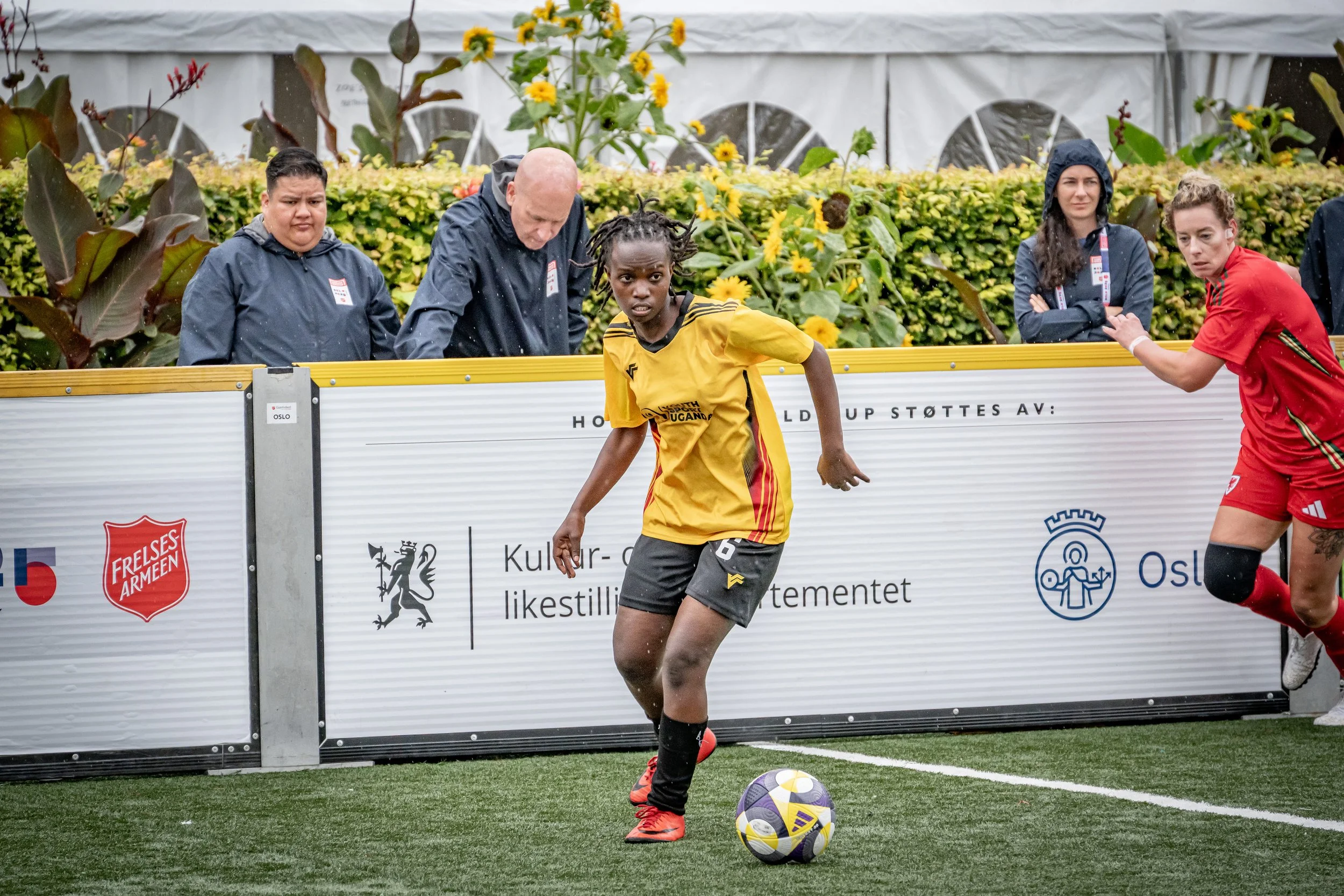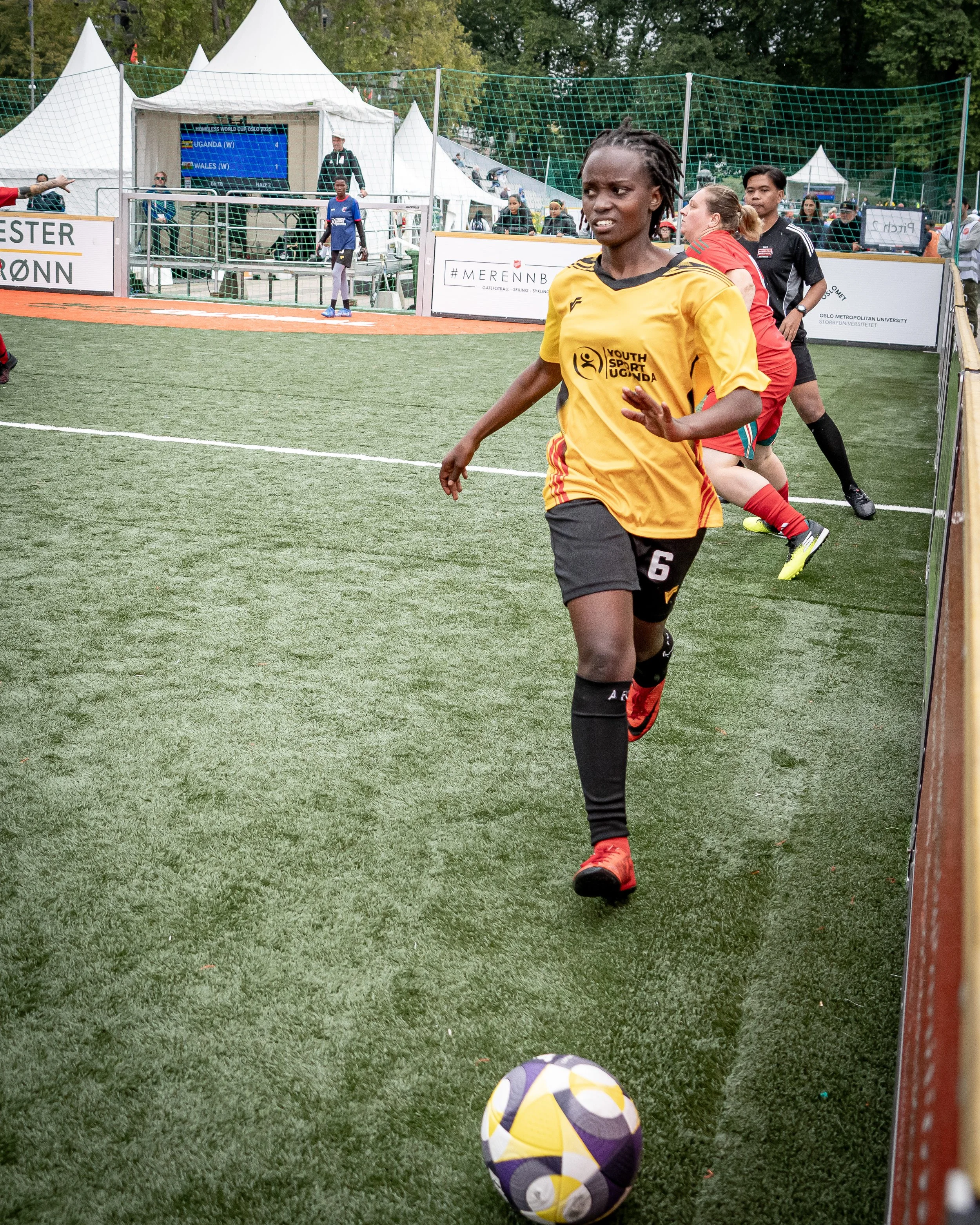The weight of the jersey, the hopes of a country
As team Uganda line up on pitch one this afternoon to face Mexico in the Women’s Cup Final, they carry the hopes of a country, both physically and metaphorically, as the wearer of shirt number six knows only too well.
“This jersey is heavier than you think,” says Shadia Nambasa, “it carries many dreams. Maybe us being in the final will also send a message back home that, like our football team, our country has to come together as a team to stop homelessness.
“Uganda is a country full of beautiful, resilient people but deep within it there is too much suffering,” she adds. And Shadia knows only too well what she’s talking about.
In their village, many miles to the west of Kampala, Shadia’s parents separated when she was a baby and in the early days she was raised by her father. When he struggled to cope, he sent her to stay with his younger sister in the Kampala slums.
She was two years old.
“I now have eight younger brothers,” she adds. “They are all from my father but from four different wives. In Uganda they don’t think of the consequences of having children - if I give birth how will this child survive? - they leave it in God’s hands.”
Their respective mothers brought them, as babies, to the city to live with Shadia - with different mothers the age gap between the boys is very close - and, as her aunt had to go to work, it has been left to Shadia to care for them for the last 19 years. Though her mother and father still live in the village, and they know she is in the city, they have no contact with her.
She is now just 21 years old.
“I had to be very strict with them, to make sure they didn’t take the wrong path,” Shadia explains, on raising her brothers. “Whatever I do, I know I have eight people behind me, I have to be that mentor. They needed someone to inspire them and it had to be me. At school I had to excel. When I started to play soccer, I had to show them I could be the best.
“They see me as a role model, they are proud of me, they are my biggest motivation and that’s what’s driving me to achieve better things in life. If I fall, they’re going to fall; if I rise, they’re going to rise.”
Living, she stresses, was just survival.
“Getting water, finding food to eat was a struggle for us - then getting a good education was a dream that we thought would not be possible because the standard of living in our country is so expensive.”
While caring for the boys, Shadia was also attending government elementary school - which is free of charge - which encouraged her to focus on her education due to the situation back home.
Then came the day where everything changed.
“When I was fifteen, I was with my brothers and they persuaded me to go to the pitch and play some football,” she recalls. “Watching at the field was a man from Youth Sport Uganda. I think they saw a talent in me that I never knew I had, so from then I entered into the football project.
“They saw a footballer in me but they also saw a broken girl, and every project they involved me in, they tried to make me whole again,” she explains. “They gave me opportunities to study, they connected me to mental health projects and my mind began to improve.
“Living in Uganda it’s very difficult to exist without having some kind of mental health or medical disorder,” she continues, “and through bringing up all my younger brothers I had what they called ‘parentification trauma’.”
The project she became involved with, called Game Connect, helps to heal through football. Participants are shown ways of coping with stress and depression, how to connect with people and develop relationships which can help them to move on in life.
“Trust me, everyone in Uganda carries a heavy weight,” Shadia adds. “It’s an invisible weight - maybe someone lacks shelter, someone else has no food, but just imagine walking in the streets of your own city and feeling invisible.
“No one is there to ask you if you’re okay, if everything is fine. We are just surviving with each day that passes, hoping to wake up into a new day.”
Shadia has lost many friends to drugs, some into marriages and children at an early age because there is no other option, but she is fighting hard not to be a statistic.
“When we are young, we go in the direction of our peers. Many of my friends went into transactional sex or became victims of GBV but I became engaged in football and took on the positive opportunity I was given.
“I’m now in my second year at Makerere University - I was able to access sponsorship through Youth Sport Uganda - and my dream is to complete my studies and become a social worker, to help other people who have been in my situation.
“I have felt what it’s like to be at the bottom, I know how the system works - people talk about change, maybe I can be that change.”
Win or lose on the pitch today, Shadia has already succeeded in changing the course of her and her brothers’ young lives - and she has a message for any players following in her wake.
“Sport can change everything. At some point in life an opportunity comes your way so take it. Experience the moment, take life as it comes but don’t forget the higher goal.”
Written By Isobel Irvine, Photos By Anita Milas



